#Martin Carthy
Text
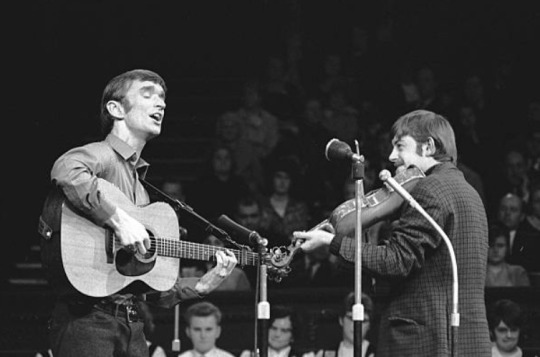
Martin Carthy & Dave Swarbrick - St. Andrews Folk Club, Fife, Scotland, 1968
Since we listened to Dylan playing "Girl From The North Country" yesterday, let's listen to the guy Bob kinda/sorta learned it from — living legend Martin Carthy! More than 60 years later, Dylan and Carthy are still pals, according to a recent Uncut interview: "He's a mate, it's a real friendship, and he always looks after his friends. I last saw him when he came over in autumn 2022, it was lovely."
Yeah, that is lovely! Let's keep the loveliness flowing with this very nice tape of Martin and his old sparring partner Dave Swarbrick, entertaining the folks up in Fife. A totally good time, Carthy's keen vocals and nimble guitar backed magnificently by Swarb's fiddle and mandolin (and occasionally some dude on spoons). It's funny to realize — no matter how fully formed and settled in their set sounds — that playing trad-folk like this was a pretty new mode. These guys were pioneers!
The pair would part ways for the time being in '69, with Swarbrick going electric with Fairport Convention. From that same Uncut interview: "Swarb said, 'Joe Boyd wants me to go and play with this fucking band of his. Oh, you know me, man, I like jazz, I can't bear this rock 'n' roll, it's all bollocks.'" Never mind the bollocks, here's Liege & Lief!
12 notes
·
View notes
Text

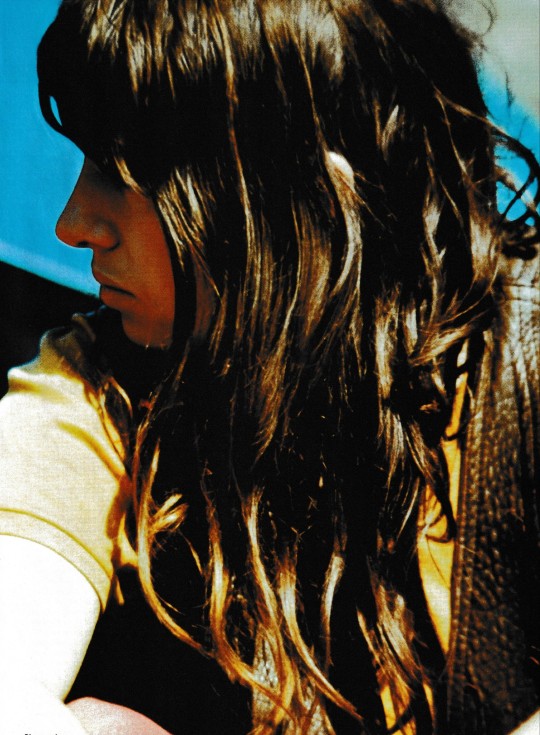

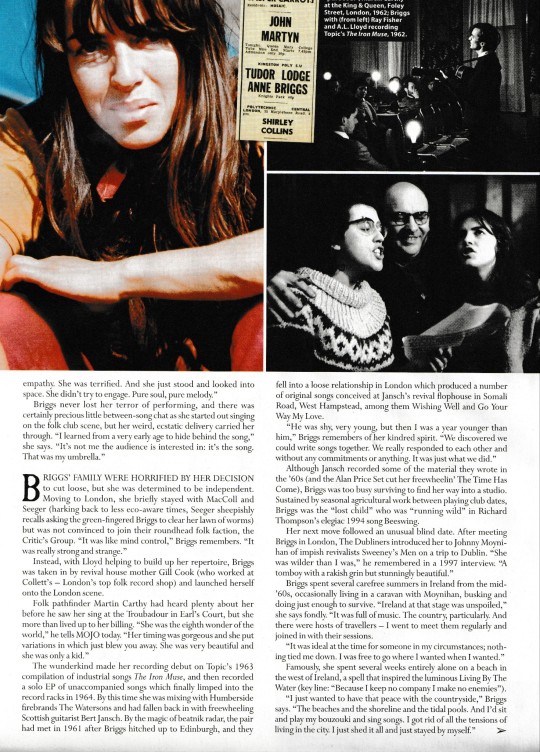
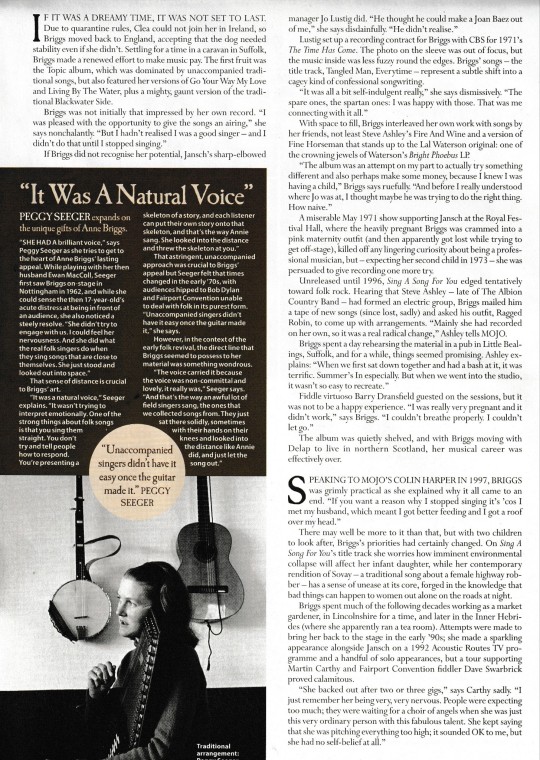
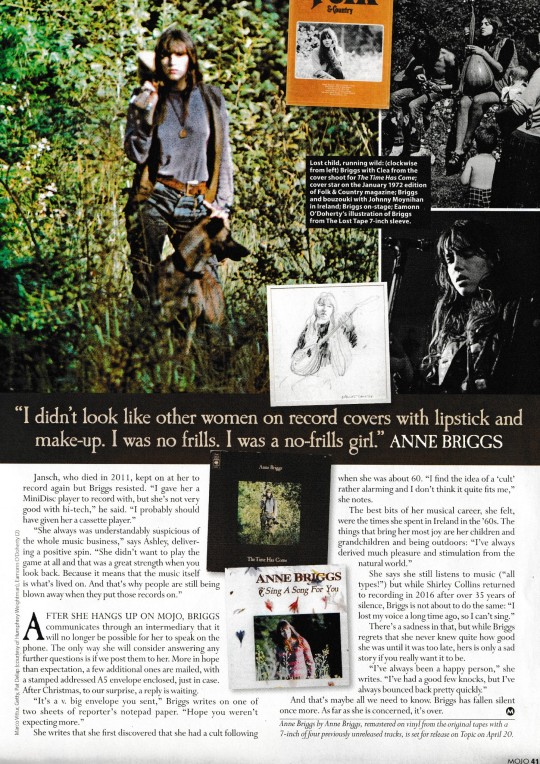
#mojo#mojo magazine#anne briggs#cecil sharp house#ewan maccoll#peggy seeger#martin carthy#ray fisher#a.l. lloyd#johnny moynihan
5 notes
·
View notes
Text
youtube
"A long time ago I came across The Dominion of the Sword in a Penguin anthology of War Poetry, and the longer I have known it the better it’s got. It was written in 1649 by an anonymous pamphleteer and with the removal of verses or lines particular to that time becomes a reflection of the propaganda lie currently being touted for all it’s worth (again) that violence or the threat of it will get you nowhere. The tune is adapted from a Breton pipe tune called Ar Ch’akouz (The Leper)."
— Martin Carthy
Lay by your pleading, law lies a-bleeding
Burn all your studies down, and throw away your reading
Small power the word has, and can afford us
Not half so much privilege as the sword does...
6 notes
·
View notes
Text

Martin Carthy & Eliza Carthy [via]
7 notes
·
View notes
Text
Carthy’s theory about the 1960s folk guitar wave was that the skiffle boom had been so big, and so many guitars sold, that inevitably some of the players turned out to be talented.
Both Dylan and Paul Simon were fans of Carthy’s distinctive arrangement of Scarborough Fair. Dylan reworked it as Girl From The North Country, Simon more or less learned it and added it to his song Canticle. At the end of the first half Carthy played a different arrangement of the song, recorded with Norma Waterson and Eliza Carthy on The Gift.
Colin Randall at Salut! Live. Talking Martin Carthy: folk legend and 'human juke box'
3 notes
·
View notes
Text
Nickel Bin #5:
Steeleye Span's Captain Coulston
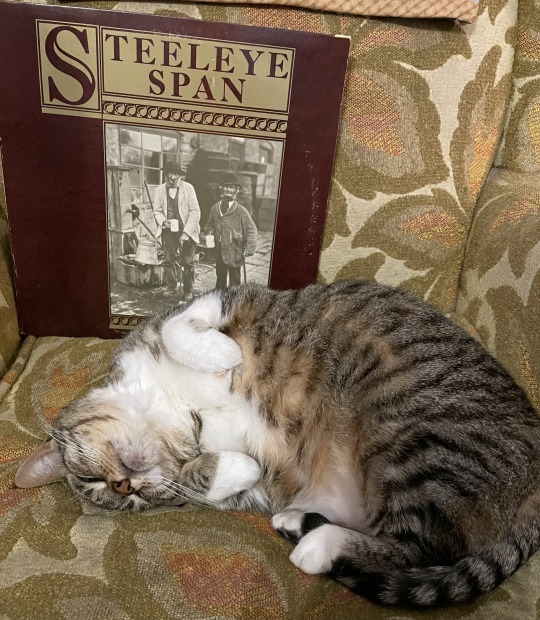
You'd be hard pressed to find a record more dedicated to not selling a single copy than Steeleye Span's Ten Man Mop or Mr Reservoir Butler Rides Again.
Yes, that's the record's title, and it features a period at the end of it although I'm pretty sure it's not a complete sentence. The record sports out of focus black and white photos of the band on the rear and the two ancients seen above behind my cat on its front; when originally issued, the gatefold opened to an entire booklet within, filled with incomprehensible gibberish; because of this extensive packaging, which the band paid for and which appealed to them alone and no one else, every copy of the record cost more to produce than it actually sold for; therefore every copy sold actually cost the band money.
The music within was entirely Irish and English traditional airs, each performed like it was 1671, not 1971. More gibberish appeared beneath each track listing, stuff like "2/1 Creeping Jane, 9/4 Skrewball, 8/1 Miss Portly, 10/1 Bar..."
The band's bass player/founder, Ashley Hutchings, was so disappointed with the final product that he quit the band the moment the recording was done. He wasn't angry that they were losing money making music that no one wanted hear; he was angry that they sounded too Irish.
Given all these factors, I find it baffling that the record somehow failed to compete with Led Zeppelin 4, Sticky Fingers, Meddle, Blue and Imagine. Hell, there are probably 40,000 copies of that year's Stephen Stills 2 out there for every existent copy of Ten Man Mop. And Stephen Stills... you know the rest of that sentence. But it's 53 years later; let's rewrite history and sing the record's praises.
Yeah, well, never mind. There are plenty of great Steeleye records to shout about, and this is not one of them. Sure, it's good - their records are all good - but let's focus in on one weird, wonderful and forgotten track, Captain Coulston.
Unlike many of the songs on the record this one is fairly modern; it was written around 1800, all about laterday Irish pirates. Aren't you excited to listen to this? I sure am.
youtube
Everything is nice at the opening, yes? Maddy Prior's strident, twisting vocals glow over Martin Carthy's complex and shimmering electric guitar and a brooding bass line.
I doubt the first two minutes are changing your life, however; you're probably wishing I was writing about Stairway to Heaven. But come on, stick with me! You heard Zeppelin 4 in seventh grade; and you've never listened to this.
At the song's two minute mark things get intense. The pirates attack, the violin swirls in and something starts pounding; maybe it's Hutching's bass or a keyboard charged with distortion; maybe it's an angry pagan god glowering about, demanding tribute. The band is suddenly mounting rare and new heights, ready to kick ass John Snow style all over Westeros.
Every time I listen to Captain Coulston I'm too into the music to really follow the plot; blood in streams does flow until, somehow, the pirates are defeated. Then the band celebrates by gliding into a deck stomping and fairly murderous reel.
Surrender to this song; surrender to the Nickel Bin.
5 notes
·
View notes
Text
258: Nic Jones // The Noah's Ark Trap

The Noah's Ark Trap
Nic Jones
1977, Trailer
His performing career cut short in a traffic accident at age 35, his back catalogue entombed in legal wrangles, Nic Jones enjoys the legend of a musician more often spoken of than heard. Jones’s final album, 1980’s Penguin Eggs, is one of the small handful of true masterpieces of the English folk revival, a maritime journey through traditional song driven by Jones’s percussive, slapping fingerstyle guitar and curlicued vocal melodies. It’s also the only one of his records that’s stayed more or less in print since its release, meaning that it has completely overshadowed the rest of his catalogue (outside those collectors with the cash or pluck to track down the increasingly pricy original editions anyway).
As a listener who has obsessed over Penguin Eggs for years, I was shocked to find an unpriced copy of 1977’s The Noah’s Ark Trap in a local shop and, after some haggling with the good-natured proprietor, walked out with it for a song. I’d heard it a few times back in my music blog .rar downloading days and I recall liking it, but since I’ve had an actual copy for my table it’s steadily grown in my estimation to the point I’d rank it the near-equal of its more celebrated younger sibling. The LP contains a similar mixture of lengthy story songs (“The Golden Glove”), bawdy cautionary tales (ode to cum “The Wanton Seed”), blazing fiddle reels (“Miles Weatherhill”), and aching ballads (“Ten Thousand Miles,” perhaps the most moving thing he ever recorded). As on Penguin Eggs, Jones plays with minimal accompaniment (six of ten tracks are solo endeavours), giving the music a lonely grandeur, like a bard narrating the sunset of an age. These are songs of ancient heritage, and while Jones’s style bears the marks of the contemporary revival (and particularly the influence of Martin Carthy) he makes no concessions to pop. There is only this man with his pure and earnest voice, the guitar he’s poured the work of a lifetime into mastering, and visions of forests and green pastures that will endure till the rocks melt and the seas burn.
youtube
258/365
#nic jones#english folk music#british folk#folk revival#martin carthy#penguin eggs#folk music#music review#vinyl record#'70s music#'70s folk#guitar virtuoso#acoustic guitar#guitar god
3 notes
·
View notes
Link
“‘I’m not interested in heritage,’ said musician Martin Carthy on the eve of his 70th birthday. “This stuff is alive.” With these words, Carthy, a celebrated and driving force in English folk music across several decades, appears to perfectly capture folk’s persistent prominence across the boundaries of language and geography. It is ironic, perhaps, that the genre is often portrayed as outdated, irrelevant, even elitist — because folk music is, in fact, the antithesis of all these things. It is a living, revolutionary art form documenting the social concerns of humanity, created by the people, for the people.”
Chris Wheatley’s latest reading list, “This Stuff is Alive,” explores the timeless, elusive definition of folk music.
32 notes
·
View notes
Video
youtube
Martin Carthy - Byker Hill
3 notes
·
View notes
Photo

In honor of Martin Carthy’s 82nd brithday, I thought I’d share this article about him from a few years ago
Bob Dylan’s 80th birthday was widely marked recently. He was not, though, the only great musician to celebrate. Martin Carthy was 80 on May 21, three days before Dylan, who has always acknowledged the influence of the older musician on his work.
In late 1959 Carthy recorded an EP for Topic Records. It is, sadly, lost. But more than 60 years later Topic is still his label and Carthy, the foremost figure in English folk music, remains one of the scene’s hardest working musicians, performing, recording and practising. “I still want to improve,” he says.
After a stint as a chorister at the Queen’s Chapel of the Savoy, Carthy began playing in coffee bars and folk clubs. In the early 60s he would often stay with the organiser after the gig. Such is his devotion to the scene and his rapport with the people involved that he still welcomes bookings from folk clubs.
In his long career Carthy has worked as a solo artist, in duos with Dave Swarbrick and John Kirkpatrick and in bands – The Albion Country Band, Band of Hope, Waterson:Carthy. He is innovative, open to ideas and musically curious. He plugged in with Steeleye Span, and played loud (“What’s the point of an electric guitar if you don’t?”). Brass Monkey, featuring trumpet, trombone and saxophone, paved the way for Bellowhead. He works with people from very different traditions – dub poetry and dhol drumming in The Imagined Village, jazz and flamenco with The Four Martins (Simpson, Taylor, Juan and Carthy)
Read the full article here
3 notes
·
View notes
Text
"The Wife Of Usher's Well (Martin Carthy feat. Dave Swarbrick)"
youtube
#the wife of usher's well#child ballads#martin carthy#folk music#british folk#traditional music#ballads#music#Youtube
2 notes
·
View notes
Text
♫ Scarborough Fair ♫ (Redux)
I really thought I’d be playing some Motown tonight after my week of Van Morrison, but sometime during the course of the evening, Simon and Garfunkel paid a visit to my mind and refused to leave! I really wanted to play Homeward Bound, but I’ve played that pretty recently, so I settled on this one that I haven’t played in over two years, and that most everyone seemed to enjoy!
In the last week…
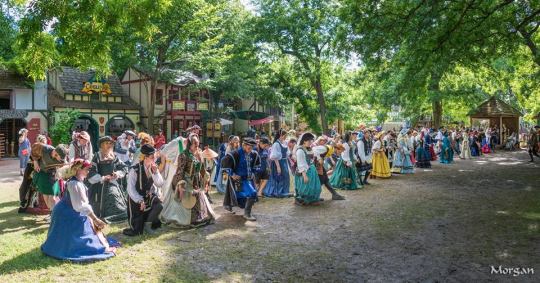
View On WordPress
0 notes
Text
Hog Eye Man
youtube
1 note
·
View note
Text
youtube
In 1969, Martin Carthy and Dave Swarbrick appeared in a BBC For Schools production of Arnold Wesker’s 1962 play “Chips With Everything.” They perform a pared down rendition of “The Cutty Wren.” Thanks to the Carthy Archive for sharing this video.
#martin carthy#dave swarbrick#the cutty wren#arnold wesker#chips with everything#tv appearance#english folk music#english folk#folk music#fiddle#acoustic guitar#YouTube
0 notes